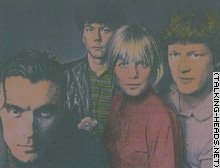
About 15 or 16 years ago, I went on a reading frenzy. I was determined to answer every history question I had. And as any historian can tell you, this is futile-- every question you answer in history brings up 2 or 3 new questions.
In this spate of reading (back when I had time to read everything I wanted) I read a great book: Crabgrass Frontier: The Suburbanization of the United States, by Kenneth T. Jackson. Jackson is best known as the guy who writes the "Don't Know Much About History" series of books. I highly recommend you add Crabgrass Frontier to your reading list. Here are some things I learned in it:
- Where the term "redlining", the bank practice of not making loans in certain neighborhoods came from, and how it helped create segregated ghettoes
- That there were hundreds of excellent "interurban" electric rail lines between large and medium-sized towns throughout the US, that were bought and killed off by GM, so that they could sell buses to municipalities
- That with FHA and VA loans, it was frequently cheaper for people to buy a new home in the 'burbs, than to renovate or expand their home in the city
- That there was almost zero growth in the number of residences built between 1930 and 1945, meaning that veterans coming home from WWII had a tough time finding housing
One of the things that became clear as I read the book is that millions of guys who survived the brutalities of the Great Depression and then World War II came home and were quite content to have the rest of their lives be boring as can be. A job, a wife, 2.3 kids, a ranch house, a beer in hand, a barbecue and a big manicured-lawn suburb was just what they wanted.
Unfortunately, this was not necessarily what their kids wanted. I wondered if a lot of the craziness of the sixties was because a generation of kids, educated and filled with expectations, exploded with boredom.
 One day, a few years later, I had a tape (remember cassette tapes?) of the Talking Heads' 1979 album "Fear of Music," one of my favorite records playing. The song "Heaven" came on. In the context of having just read Crabgrass Frontier, I heard the song in a new way. David Byrne sang, dreamily:
One day, a few years later, I had a tape (remember cassette tapes?) of the Talking Heads' 1979 album "Fear of Music," one of my favorite records playing. The song "Heaven" came on. In the context of having just read Crabgrass Frontier, I heard the song in a new way. David Byrne sang, dreamily:Heaven, Heaven is a place/Where nothing/Nothing ever happens...
It was a brilliant commentary by a baby-boomer on suburbia; this place where nothing ever happens, was heaven to the generation before.
I congratulated myself on my new interpretation of the song, and went through life with my belief in the deeper meaning of the song.
My bliss was, alas, not meant to last. One day I was listening to the radio , and heard Heaven. At the end of the song, the deejay mentioned that David Byrne had said it was about a nightclub in late seventies Manhattan-- a placed called "Heaven," where nothing ever happened. The song was about a stupid, boring Soho nightclub. I was scarred for life.




8 comments:
Real estate is a game that squares played...until we were all left in the dust with falling-apart-rentals and stoves that were small, brown and inable to accomodate turkeys. wellcome to genx, stypid unbuying, unrelentless left-behinders. here we are, superstar!
I think i meant stupid
That TH song Heaven is wonderful. I used to play that over and over.
Thanks for the book suggestion. Most of my reading this summer has been nature-related, and specifically dealing with the relationships between humankind and nature.
Palette,
I like stypid better. I think you've created a new adjective.
Bubs-- have you read any Edward Abbey-- The Monkey Wrench Gang was one. He dealt with those themes.
I read some Abbey years ago. He's on my list to read again now that I'm a grownup.
I've turned into something of a cranky neo-luddite over the past few years, and I'm interested in seeing what I think of Abbey now.
Over the past year I've read, these books, and it wasn't until I finished the last one that I realized they all had kind of a theme:
The Swamp: The Everglades, Florida, and the Politics of Paradise
The Omnivore's Dilemna
Shadow of the Bear: Travels in a Vanishing Wilderness
Breach of Faith: Hurricane Katrina and the Near Death of an American City
Out of Eden: An Oddyssey of Ecological Invastion
The Omnivore's Dilemna was great, wasn't it? made me really think about what I was putting into my body and where it had been.
Great post, I surfed over here from Bubs' place. The book sounds interesting and your interpretation of the song versus what it was supposed to be about was pretty funny. I agree with Dirty, sometimes we're the artist with the most meaning.
Post a Comment